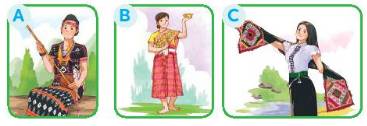Talk about one of ethnic groups do you know
Hãy nhập câu hỏi của bạn vào đây, nếu là tài khoản VIP, bạn sẽ được ưu tiên trả lời.


Tham khảo
Platforms use for online classes: Microsoft Teams, Zoom, Google Meet, ...
- Benefits:
+ Easy to use and deploy
+ Zoom App Pricing goes easy on the budget
+ Zoom makes your work more flexible
+ Better Service on Slow Connections
- Problems:
+ Delayed Customer Service
+ Zoom Security Concerns
+ Cyber Attacks may shrink the number of users
+ Zoom App Server is reported to be Linking to China

Tay ethnic minority occupies 1st place in the ethnic minorities of Vietnam. While Viet people have 86% of the population, Tay residents have less than 2%. Their number is estimated at approximately 1.7 million. It is estimated, they are in Vietnam already in the year 500 A.D. This group is divided into the another smaller groups (e.g. Ngan, Phen, Tho, Thu Lao, Pa Di). People inhabit the area mainly in the north-eastern part of northern Vietnam, in the provinces of Cao Bang, Lang Son, Bac Kan, Quang Ninh, Ha Giang, in smaller numbers in Yen Bai and Lao Cai.
The culture of the Tay ethnic group is very rich. Starting with traditional folklore and wedding songs, poems, dances and music. The well-known song is “Hat Luon“, it’s called. duet between lovers. During the year, there are a several festivals and celebrations that have different meanings. They are typical farmers and some traditions have persisted to the present. E.g. long tradition in the cultivation of wet rice, digging irrigation canals, threshing grain rice on wooden racks (Loong). The most famous craft of Tay ethnic minority is weaving brocade of original designs, which are highly prized.
Clothes are not so colorful as with other ethnic minorities. Clothes are made of cotton that is dyed indigo color. There is not so much to see the embroidery or other decorations. Women wear skirts or pants, polo shirt and black scarf, men wear trousers and shirt or T-shirt. Thu Lao ethnic minority wears cone-shaped scarf on their heads and Tho ethnic minority dresses like Thai residents of Mai Chau town.
Dwellings are similar to Thai residents, the house is built on the pillars. They use the tiles, straw or palm leaf for building the roof and wood or bamboo for walls. The villages are often built in the foothills and are often named according to mountains, rivers or fields that are located here. Villages are often large and have dozens of homes at once.

Topic 3: Talk about an ethnic group in Viet Nam you know
1. What is the name of ethnic group?
It's Viet or King group
2. Where do they live?
They live in other countries
3. Which language do they use ?
They use Viet-Muong group
4. What are their production activities
+growing rice
+raising cattle and poultry
+working in the factory........

Sắc tộc?
The Kinh are also known as the Vietnamese, and Son La is the second largest group, accounting for 18% of the province's population. Population is concentrated in urban areas. Kinh language in Vietnamese - Muong language. Apart from the part of ethnic minorities residing in Son La area, many people have just moved from the North and North Central Plains. Especially since listening to the call of the Party to build mountainous economic development, Kinh people from the delta provinces to Son La; The family of Dien Bien Phu campaign soldiers stayed in the mountainous region. At present, some areas in the province of Kinh ethnic minorities include Kinh people in Hai Duong, Hung Yen and Thai Binh provinces in Song Ma and Yen Chau districts; Thai Binh province in Thuan Chau, Ha Tay province in Mai Son and so on.Kinh people living in Son La are interspersed with ethnic minority people. They quickly integrate in production, cultural exchange and solidarity to create cohesion and development in Son land. Leaves. The Kinh are also called Vietnamese. The Kinh language belongs to the Viet-Muong language group. Kinh people do farming. In the wet rice cultivation, the Kinh people have traditionally built dikes, ditches. Horticulture, mulberry growing, livestock and poultry husbandry, river fishing and marine fish development. Pottery is very early. Kinh people have habits betel betel, drinking tea, water. In addition to fried rice, sticky rice, also porridge, sticky rice. Shrimp sauce, duck eggs flipped is a unique dish of the Kinh.The Kinh village is often surrounded by bamboo, and there is a strong village gate in many places. Each village has a communal meeting place and worship. Kinh people live in the land. In the Kinh family, the husband (the father) is the owner. Children take their father and father's relatives as "family", while mother is "grandfather". The first son was responsible for organizing the worship of his parents, grandparents. Each of them has their own church, with their heads in charge of their work. Monogamy marriage The wedding is going through many rituals, the boy asked his wife and married his wife. After the wedding, the bride returns home. The men respect virginity, virtue of the bride, and pay attention to their background.The ancestor worshipers of the Kinh. The deceased are sacrificed by their descendants every year on the day they die. Their graves are regularly visited by relatives and carers. Every year the farmer has a series of festivals and festivals associated with farmer beliefs. In addition, Buddhism, Taoism, Taoism, Catholicism from the outside came into being received at different levels. The literary capital of the Kinh is quite large: oral literature (stories, folk songs, proverbs), literary literature (poetry, literature, books). Early and advanced art in many respects: singing, music, sculpture, painting, dancing, singing. The annual village festival is one of the most exciting and lively events in the countryside